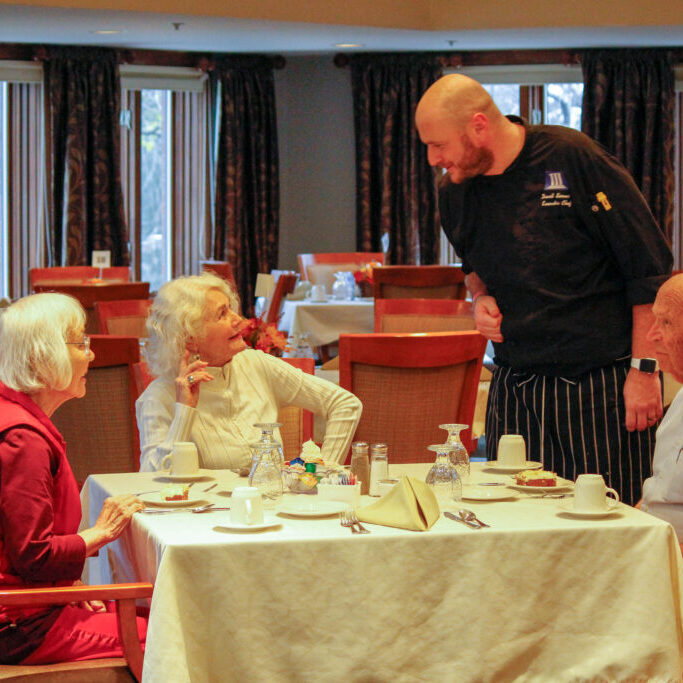Common Challenges for a Person Who Experiences Dementia
Caring for a loved one who has dementia is a full-time job. It can also feel like a thankless one, since they might seem to resent the care you’re trying to provide. Even if you’re not the caregiver, but someone who loves and spends time with a person with dementia – there can also be frustrations and a feeling that your love is not well-received. This can be an incredibly difficult situation to navigate while still taking care of your own needs.
At Three Pillars, we’ve cared for people who experience dementia for many decades. Among many things we’ve learned, we find that considering things from the perspective of the person with memory loss can help things run smoother.
Here are some things to keep in mind as a caretaker or companion to someone who experiences dementia. Consider these feelings from their perspective as you devise your plan for offering care or formulating responses.
3 Common Feelings of People Who Experience Dementia
1. Feeling infantilized
One of dementia care’s greatest challenges is that, often, the patient’s safety and well-being depends on thoughtful rules and ongoing supervision. When they’re able to verbalize it, people with dementia often report feeling like they’re “being treated like a child.” Unfortunately, limits to their freedoms may be necessary to keep them out of harm’s way. However, that doesn’t make it any easier to tell your loved one that they can’t leave their house alone anymore. Enforcing these necessary guidelines can cause significant conflict and lead to aggressive behaviors during moments of confusion or memory loss.
Patient, consistent reinforcing of boundaries is important, but maintaining that level of supervision can be tricky. If this describes your situation, the 24/7 support offered at an assisted living or specialized memory care community can be a life-changing resource for both you and your loved one.
2. Boredom
We all need work, hobbies, or other pursuits to occupy our minds. Frequently, people who have dementia have difficulty connecting with these activities. Dementia symptoms can turn even regular, daily tasks into frustrating challenges. This can cut the patient off from many sources of joy and stimulation that they knew before their symptoms.
“Finding simple projects, self-care tasks, and other leisure activities for the individual to try can make a significant positive impact on mood.”

An important thing to keep in mind is that activity of any form is a good thing.
3. Loneliness and Fear
Feelings of abandonment are common among those who experience memory loss. However, these feelings can be managed. Finding a supportive, social community for them to call home is often key to alleviating those feelings. Frequent visits from family members can also help them feel loved and connected to others, even as they live with dementia. As with any other challenge in life, dementia is easier to bear when they feel they’re not going it alone.
Cognitive decline is often a scary thing to experience, and depending on the progression of their disease, they may be aware of their slipping cognitive abilities while grasping that they have no way to prevent it. They’re often aware of the effect their dementia has on others, as well. This can be isolating, especially to those who grew up believing that they should never be a burden.
Love, acceptance, and continued connection to family can help alleviate these feelings, especially when offered alongside expert clinical care found in an assisted living or memory care community setting. An environment dedicated to stability, safety, and encouraging active living can make all the difference.
3 Common Questions from Caregivers
As you explore how to offer the best care you can or consider assisted living options, know that you’re not alone. Here are some of the most frequently asked questions and concerns we hear from families trying to do what’s best for their loved one.
1. At what point do they need 24-hour supervision?
If behaviors or symptoms caused by dementia threaten the person’s safety, ongoing supervision is absolutely recommended. However, this isn’t the only test to consider. If caring for your loved one is impossible given your life circumstances or it’s causing your own physical and mental health to deteriorate, you should consider an assisted living community. Every caretaker decides for themselves when that threshold has been crossed.
2. What if someone with dementia becomes aggressive?
Out-of-character aggression is unfortunately something that can come with dementia. In most cases, aggression isn’t meant to be malicious or hurtful. It can result from any number of causes, including physical discomfort that the patient is having trouble communicating, overstimulating environments, or frustration with unclear instructions.
The challenge for caregivers is to see the feelings without judgment. Outbursts may seem disproportionate or irrational at face value. Keep in mind that the feelings may not make sense to the person feeling them, either. Helping them find the source of their feelings and addressing it together is key.
Expert health practitioners at an assisted living facility will know exactly how to provide specialized care for your loved one. They’ll focus on compassionate responses to their anger, humanely diffusing the situation, and helping the person respond to their feelings. They can also help you navigate any aggression your loved one displays when being informed that assisted living is the best path forward.
3. What if a loved one with dementia wants to go home after they move to a community?
Moving to assisted living is a dramatic transition for many residents. Wanting to go home is a common initial reaction to that transition. Just like those without dementia, someone with memory loss will seek out something familiar when faced with an unknown environment. The process of integrating into their new community can be slow and uncomfortable.
With patience, compassion, and support from their families or friends, they can find their place in a community and create a happy life for themselves at assisted living. In many cases, this feeling will pass after the first weeks or months.
Three Pillars is here to help you and your loved one, whether it’s to help answer a question or take you on a tour of our communities. Leave a comment below or contact one of our Senior Living Consultants today and we’ll help however we can.




